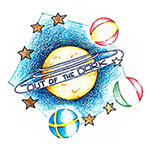The examination of the results of the OCSE Pisa research about students’ achievements in scientific literacy highlights that most European students need to improve their skills and competences in this field, which is basic and transversal to acquire a fundamental knowledge to be used and enriched in the perspective of the life long learning. Thus, the addressees of the project are students aged 14-17 and teachers from four countries geographically located in the different cardinal points in the European Union.
The interchange of practices and the knowledge acquired by the students will represent two complementary aspects of a project aiming at the “scientific” and “human” development of all the protagonists involved in it. The new “light” projected on this learning experience will help the students to become more aware of some of the “dark” spots which have been the object of investigation since ancient times. Research never ends and everyone could have an important role in it, starting from school experiences of paramount importance.
The regular confrontation and exchange of information, competences and ideas among teachers is fundamental in order to teach in a more effective and innovative way.
